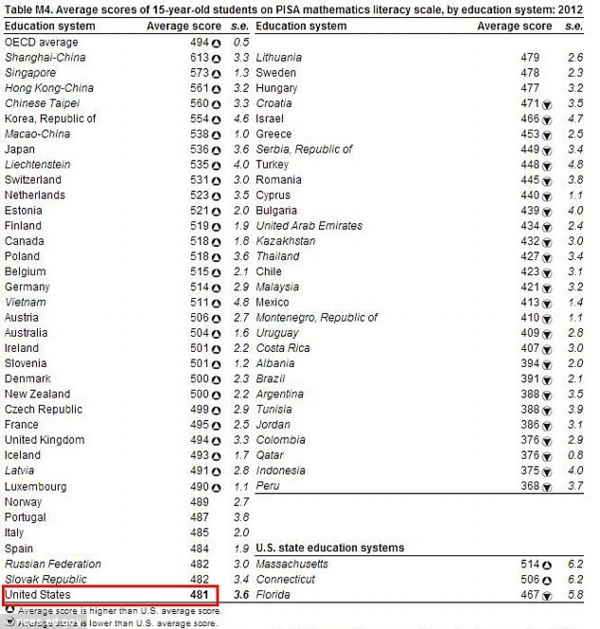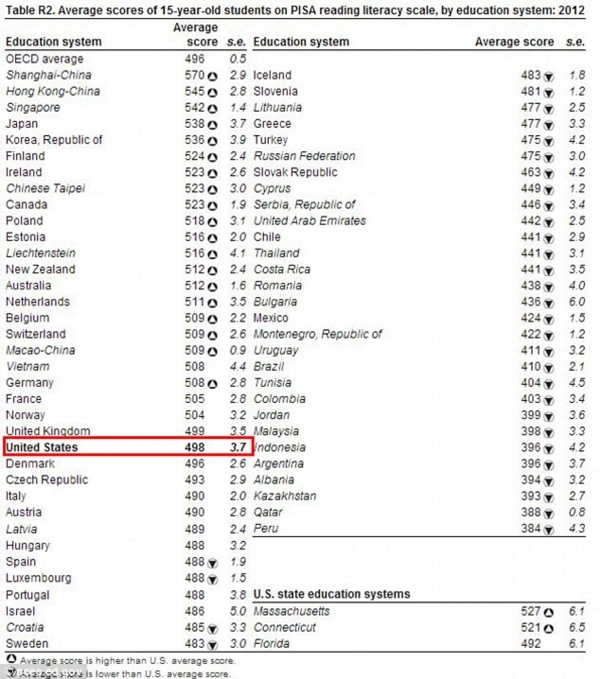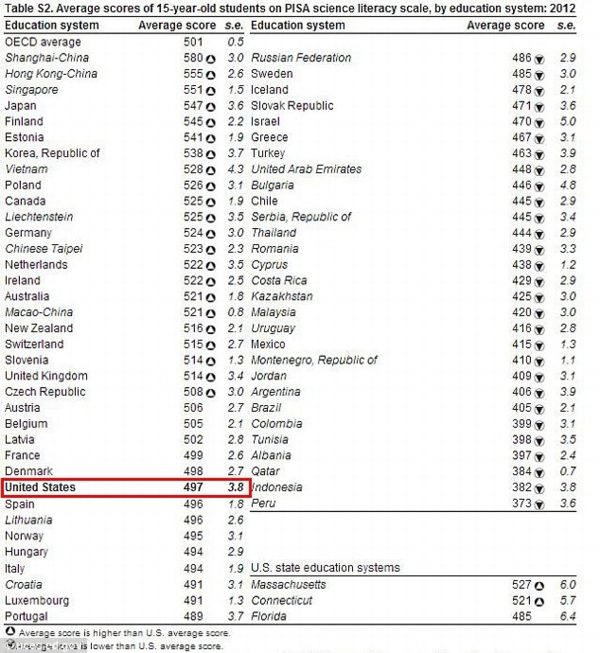 America’s school children are falling even further behind other nations in the core subjects of reading, mathematics and science, according to a new study released this week.
America’s school children are falling even further behind other nations in the core subjects of reading, mathematics and science, according to a new study released this week.
The worrying data, compiled as part of the Program for International Student Assessment (PISA), found that the academic performance of 15-year-olds in the U.S. has remained relatively flat in recent years, while other nations have experienced significant growth.
With the results leave the U.S. floundering around the middle of the world’s sixty-five wealthiest nations, the top performers in all three subject areas were from Asia.
The high achievers included Shanghai, one of three educational systems in China that participated, Singapore, the Republic of Korea and Japan.
 ‘We are not seeing any improvement in the U.S. … our ranking is slipping because other countries are improving,’ Jack Buckley, commissioner of the National Center for Education Statistics (NCES), told CBS News.
‘We are not seeing any improvement in the U.S. … our ranking is slipping because other countries are improving,’ Jack Buckley, commissioner of the National Center for Education Statistics (NCES), told CBS News.
The United States’ under-performance was most striking in maths, where the average score of 481 was well below the OCED average of 494.
Just nine percent of 15-year-olds scored in the top two levels of proficiency in math, compared with an average of 13 percent among industrialized nations and as high as 55 percent in Shanghai, 40 percent in Singapore, and 17 percent in Germany and Poland.
U.S. students’ strongest subject was reading, a score of 498 was two points above the OECD average but well behind the leading nations.
 The average U.S. score in science was 497, slightly behind the OCED average of 501 left the country in 28th position out of 65 countries.
The average U.S. score in science was 497, slightly behind the OCED average of 501 left the country in 28th position out of 65 countries.
For the first time three U.S. states – Connecticut, Florida, and Massachusetts – received separate scores.
Massachusetts’s average scores were higher than the U.S. and OCED averages in all three subjects, and Connecticut’s average scores were higher than the overall averages in science and reading.
Florida fared less well and was below both the U.S. and OCED averages on all three subjects.
The National Education Association, the nation’s largest teachers union, was quick to blame the poor results on the effects of poverty on American students.
‘The United States’ standings haven’t improved dramatically because we as a nation haven’t addressed the main cause of our mediocre PISA performance – the effects of poverty on students,’ said NEA President Dennis Van Roekel.
NCES’s Buckley noted that American students from families with incomes in the highest quartile didn’t perform as well as students with similar backgrounds in other countries.
 Stanford University economist Eric Hanushek warned that the lagging performance would eventually start to have an impact on economic growth.
Stanford University economist Eric Hanushek warned that the lagging performance would eventually start to have an impact on economic growth.
‘Our economy has still been strong because we have a very good economic system that is able to overcome the deficiencies of our education system,’ he told the New York Times.
‘But increasingly, we have to rely on the skills of our work force, and if we don’t improve that, we’re going to be slipping.’
Just over 6,100 American students took the PISA international standardized tests. The assessment is administered every three years and was first implemented in 2000.
NCES highlighted Ireland and Poland as examples of countries whose average scores were not drastically different from the U.S.’s in 2009, but both have passed the U.S. in all three subjects in the latest report.
The assessment was developed and organized by the Organization for Economic Cooperation and Development (OECD) and was implemented in the U.S. by NCES.
Written by David McCormack and published by the Daily Mail ~ December 3, 2013.
 FAIR USE NOTICE: This site contains copyrighted material the use of which has not always been specifically authorized by the copyright owner. We are making such material available in our efforts to advance understanding of environmental, political, human rights, economic, democracy, scientific, and social justice issues, etc. We believe this constitutes a ‘fair use’ of any such copyrighted material as provided for in section 107 of the US Copyright Law. In accordance with Title 17 U. S. C. Section 107, the material on this site is distributed without profit to those who have expressed a prior interest in receiving the included information for research and educational purposes. For more information go to: http://www. law. cornell. edu/uscode/17/107. shtml“
FAIR USE NOTICE: This site contains copyrighted material the use of which has not always been specifically authorized by the copyright owner. We are making such material available in our efforts to advance understanding of environmental, political, human rights, economic, democracy, scientific, and social justice issues, etc. We believe this constitutes a ‘fair use’ of any such copyrighted material as provided for in section 107 of the US Copyright Law. In accordance with Title 17 U. S. C. Section 107, the material on this site is distributed without profit to those who have expressed a prior interest in receiving the included information for research and educational purposes. For more information go to: http://www. law. cornell. edu/uscode/17/107. shtml“
